Molnupiravir is an oral antiviral developed by Merck and Ridgeback Biotherapeutics. It is a small-molecule ribonuceloside progdrug of N-hydroxycytidine (NHC), which has activity against SARS-CoV-2 and other RNA viruses. NHC undergoes phosphorylation within the virus and is then incorporated into viral RNA, ultimately causing accumulation of errors in the viral genome leading to inhibition of replication and a decline of infectious virus. Molnupiravir has been shown to be effective against all known SARS-CoV-2 variants.
Results from the MOVe-OUT Trial were released in December 2021 and showed a modest benefit (30% relative risk reduction) in decreasing all-cause hospitalization or death by day 29 when molnupiravir was given to non-hospitalized adult patients with mild-to-moderate COVID-19 illness and who were at high risk for progression to severe disease. Molnupiravir was also shown to be well-tolerated in this RCT, with comparable incidence of relatively mild adverse events to placebo.
Given these results, as well as the benefit of being one of the only orally-available antivirals against SARS-CoV-2, use of molnupiravir in the treatment of non-hospitalized patients with mild-to-moderate COVID-19 who are high risk for disease progression should be considered.
Clinical Circumstances
What severity of COVID-19 would you recommend use of this medication (i.e. mild, moderate, or severe illness; outpatient vs inpatient use)?
Recommended for use in non-hospitalized adults patients with mild-to-moderate illness who are at high risk for progression to severe disease.
- As of 1/19/22, molnupiravir cannot be initiated nor continued on the inpatient side.
- MOVe-OUT trial enrolled adults with a positive SARS-COV-2 within </=5 days of symptom onset who were at increased risk of severe disease including:
- >60 y/o, active cancer, CKD, COPD, obesity (BMI>/=30), serious heart conditions, DM
- Unvaccinated against SARS-COV-2 (prior receipt of SARS-COV-2 vaccination was an exclusion criteria)
- There is no data at this time to suggest that molnupriavir is effective when started beyond 5 days from symptom onset.
- Given that patients enrolled into the MOVe-OUT study were unvaccinated it is unclear how effective molnuvpiravir will be in patients with either natural immunity or COVID-19 vaccination. Subgroup analysis in MOVe-OUT: Baseline SARS-CoV-2 nucleocapsid antibody status
- Positive [ARR 2.3 (-1.7 o 7.1)] vs. Negative [ARR -5.1 (-8.8 to -1.6)]
Would you recommend restricting this medication in some way?
- No. Use in non-hospitalized patients should be determined at the discretion of the primary provider.
- The following current clinical prioritization standards from the Minnesota Department of Health (updated 1/12/22), as well as guidance from the CDC, should be used to help prioritize patients for molnupiravir and other COVID-specific therapies:
- M-MASS (modified Monoclonal Antibody Screening Score) Scale of 0-19
- Age ≥ 65 years (2 points)
- BMI ≥ than 35 kg/m2 (2)
- Diabetes (2)
- Chronic kidney disease (3)
- Cardiovascular disease in a patient ≥ 55 years of age (2)
- Chronic respiratory disease in a patient ≥ 55 years of age (3)
- Hypertension in a patient ≥ 55 years of age (1)
- Immunocompromised status (4)
Non-pregnant patients with M-MASS score 1-3 = molnupiravir
Non-pregnant patients with M-MASS score 0 = isolation, no treatment indicated
- NIH provides the following recommendations for COVID-19 therapies for high-risk, nonhospitalized patients with mild to moderate COVID-19 (listed in order of preference):
- Paxlovid
- Sotrovimab
- Remdesivir x 3 days
- Molnupiravir
- Molnupiravir should be considered over Paxlovid if renal dysfunction or drug-drug interactions would make use of Paxlovid unacceptable.
Molnupiravir should be considered over sotrovimab or remdesivir when there are supply issues or other circumstances prevent a patient from being able to receive IV therapy (i.e. unable to get to infusion center to receive medication).
Med-specific considerations
Based on the current literature, what dosing is recommended?
- 800 mg orally every 12 hours for 5 days. Molnupiravir is not authorized for use for >5 consecutive days.
Is drug monitoring required? If so, what is suggested?
- No specific drug monitoring is required
Supply and procurement consideration: Is treatment currently available for use in our system, and if so are shortages anticipated? Are there currently restrictions or other barriers?
- Molnupiravir is currently only available through Emergency Use Authorization (EUA) through the FDA. Supply will be obtained via allocation through the U.S. government.
- Current supply is obtained from the state department of health under allocation and is not currently available from normal supply chain. The supply of this product remains very limited.
Use in special populations.:
- Molnupiravir is not authorized for use in patient < 18 years of age as bone and cartilage toxicity were observed in animal studies. The safety and efficacy of molnupiravir have not been established in pediatric patients.
- Molnupiravir is not recommended for use in pregnant women with COVID-19 due to risk of embryo-fetal toxicity. Individuals (both males and females) of reproductive potential should be advised to use an effective method of contraception correctly and consistently, as applicable. See molnupiravir Fact Sheet for Healthcare Providers for more information.
- Prior to initiating treatment with molnupiravir, assess whether an individual of childbearing potential is pregnant or not.
- Females should use an effective method of contraception during treatment with molnupiravir and for 4 days after the final dose.
- Males who are sexually active with females of reproductive potential should use an effective method of contraception during treatment and for at least 3 months after the final dose.
- Pregnancy is not to be considered a limitation of the EUA and may be considered in certain clinical scenarios in which the benefit for the use of molnupiravir is thought to outweigh the risk.
- All pregnant patients prescribed molnupiravir should also include a Warning and Precaution of use during pregnancy. A surveillance program has been set up by the Sponsor to collect information on pregnancy outcomes in individuals exposed during pregnancy.
- It is unknown whether molnupiravir has an effect on the breastfed infant or effects on mild production. Breastfeeding is therefore not recommended during treatment and for 4 days after the last dose.
- Molnupiravir does not require dose adjustments for patients with renal or hepatic impairment, and therefore could be considered in these populations where other COVID-specific therapies may not be safe or appropriate due to these reasons.
- There is a theoretical concern that use of molnupiravir in immunocompromised patients may have a potential for enhanced viral evolution as they may have more prolonged periods of viral shedding. There is no restriction for the use of molnupiravir in immunocompromised persons.
 = Supporting use article = Supporting use article |
 = Neutral Article = Neutral Article |
 = Contradicting use article = Contradicting use article |

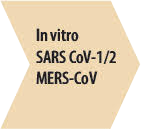  |
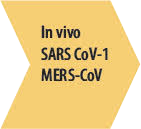 |
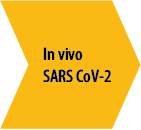      |
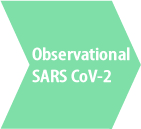 |
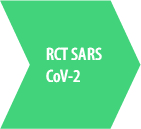  |
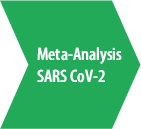 |
Major peer-reviewed studies
 Peer Reviewed SARS-CoV2 Randomized Controlled Trial
Peer Reviewed SARS-CoV2 Randomized Controlled Trial
- MOVe-OUT Trial
- Citation: Bernal AJ, Gomes da Silva MM, Musungaie DB, et al. Molnupiravir for oral treatment of Covid-19 in nonhospitalized patients. N Engl J Med. 2021 Dec 16. doi: 10.1056/NEJM0a2116044. Online ahead of print.
- Type of study: Randomized Controlled Trial (RCT) SARS-CoV-2
- Details of study: The MOVe-OUT trial is a phase 3, multi-center, double-blind, parallel-group, randomized, placebo-controlled trial evaluating molnupiravir for the treatment of mild-to-moderate COVID-19 in non-hospitalized adult patients who are at high risk for progression to severe disease. The study compares molnupiravir, 800 mg orally twice daily for 5 days, to matching placebo. Eligible patients had to have onset of COVID-19 signs and symptoms within 5 days of randomization. The primary outcome was the incidence of hospitalization for any cause or death at 29 days. A total of 1433 participants underwent randomization and 1408 participants were included in the all-randomized modified intention-to-treat population (709 received molnupiravir and 699 received placebo). Initial interim analysis evaluated the risk of hospitalization for any cause or death through day 29 was lower with molnupiravir (28 of 385 participants [7.3%]) than with placebo (53 of 377 [14.1%]) (difference, −6.8 percentage points; 95% confidence interval, −11.3 to −2.4; P=0.001). However, in the all randomized patient group, molnupiravir reduced the incidence of all-cause hospitalization or death by approximately 30% at day 29 (6.8% in molnupiravir group, 9.7% in placebo group; difference, -3.0 percentage points; 95% CI, -5.9 to -0.1). Similar incidence of adverse events were observed in the molnupiravir and placebo groups.
- Article is supportive of use: Yes. This study showed a modest decrease in hospitalizations or death with molnupiravir treatment when compared to placebo in high-risk adults with mild-to-moderate COVID-19 illness and only mild adverse reactions related to molnupiravir administration.
- Discussion points:
- Incidence of hospitalization or death with placebo in this study was higher than in published clinical trials evaluating monoclonal antibody treatments in similar patient populations (3-7%), suggesting that participants enrolled in this trial were at higher risk for disease progression
- Unclear reasons for the difference in point estimate for treatment difference between interim analysis and all-randomized mITT populations
- Imbalances between groups, shifts in epidemiology of COVID-19 pandemic, regional variation among enrolled participants, different hospitalization practices among participating countries
- Data not generalizable to certain populations (<18 years of age, pregnant women)
- Molnupiravir effectiveness for the treatment of COVID-19 vaccine breakthrough infections is unknown
- Molnupiravir effectiveness for the treatment of COVID-19 due to the Omicron variant is unknown
Other relevant studies
- Painter WP, Holman W, Bush JA, et al. Human safety, tolerability, and pharmacokinetics of molnupiravir, a novel broad-spectrum oral antiviral agent with activity against SARS-CoV-2. Antimicrob Agents Chemother. 2021;65(5):e02428-20.
- Khoo SH, Fitzgerald R, Fletcher T, et al. Optimal dose and safety of molnupiravir in patients with early SARS-CoV-2: a phase I, open-label, dose-escalating, randomized controlled study. J Antimicrob Chemother. 2021;76(12):3286-3295.
- Sheahan TP, Sims AC, Zhou S, et al. An orally bioavailable broad-spectrum antiviral inhibits SARS-CoV-2 in human airway epithelial cell cultures and multiple coronaviruses in mice. Sci Transl Med. 2020;12(541):eabb5883.
- Cox RM, Wolf JD, Plemper RK. Therapeutically administered ribonuceloside analogue MK-4482/EIDD-2801 blocks SARS-CoV-2 transmission in ferrets. Nat Microbiol. 2021;6(1):11-18.
- Gordon CJ, Tchesnokov EP, Schinazi RF, Götte M. Molnupiravir promotes SARS-CoV-2 mutagenesis via the RNA template. J Biol Chem. 2021;297(1):100770.
- Wahl A, Gralinski LE, Johnson CE, et al. SARS-CoV-2 infection is effectively treated and prevented by EIDD-2801. Nature. 2021;591(7850):451-457.
- Abdelnabi R, Foo CS, De Jonghe S, Maes P, Weynand B, Neyts J. Molnupiravir inhibits replication of the emerging SARS-CoV-2 variants of concern in a hamster infection model. J Infect Dis. 2021;224(5):749-753.
- Rosenke K, Hansen F, Schwarz B, et al. Orally delivered MK-4482 inhibits SARS-CoV-2 replication in he Syrian hamster model. Nat Commun. 2021;12(1):2295.